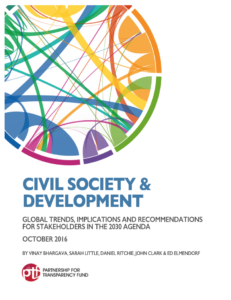
REPORTS
Civil Society & Development: Global Trends, Implications and Recommendations for Stakeholders in the 2030 Agenda
Vinay Bhargava, Sarah Little, Daniel Ritchie, John Clark, A. Edward Elmendorf
October 2016
The 2030 Agenda for Sustainable Development commits all 193 UN Member States to achieving 17 Sustainable Development Goals (SDGs) through collective efforts between a wide range of stakeholders, including governments, the private sector and civil society. The 2030 Declaration specifies roles and responsibilities for civil society to play but is ambiguous on how partnership structures would be forged at the national level. The Addis Ababa declaration on financing the SDGs is fuzzy on how civil society participation will be financed.
A team of PTF experts have analyzed several global trends concerning civil society’s role in development and their implications for various stakeholders in Civil Society & Development: Global Trends, Implications and Recommendations for Stakeholders in the 2030 Agenda to build a better understanding of the benefits, challenges and modalities for CSO engagement.
The research presented examines the changing nature of civil society, identifying six global trends:
- Civil society has grown in size, diversity and influence and is being recognized as a key development partner together with government and the private sector.
- Funding for development is changing. Private aid sources are growing and being integrated into innovative financing partnerships with official aid donors and governments.
- International organizations are forging collaborative relationships with CSOs as development partners.
- Civil society is taking initiatives to enhance its own governance and accountability.
- Despite these developments, the space for civil society engagement in the development policies and programs varies widely from country to country and sector to sector.
- Future funding is a growing concern of CSOs.
With these changes come new demands for transparency, accountability, legitimacy, and impact. In its concluding section, the paper discusses the implications of the six trends and makes recommendation linked to the implications, for stakeholders in government, official donors (bilateral and multilateral organizations), philanthropists and other private donors and civil society itself during the fifteen-year period of the 2030 Agenda (2016-2030).

